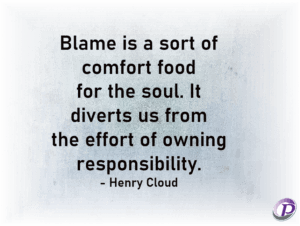
2 min readAsk The Critical Question
by Guy Gage | June 20, 2021 | Business, Leadership, Personal Management

Learn From Experience
Albert Einstein has been (mis)quoted as saying, “Insanity is doing the same thing over and over again and expecting different results.” Whether he said it or not, the truth is the truth. How easy it is to not learn from prior mistakes.
Interestingly, this adage also holds true for situations that didn’t go well. For instance, when we disappoint someone, it’s uncomfortable and awkward. No one sets out to disappoint another. Yet when we find ourselves in the same situation again, we didn’t learn anything from the last time. So we repeat situations again and again, disappointing people along the way. So why don’t we learn?
Why We Don’t
Whenever you become aware that you disappointed a colleague or a client, your first reaction is to defend yourself. Your thinking brain goes into hyper-mode to ward off the attacks because it wasn’t your intent. Reasons, explanations and justifications flood your brain to demonstrate it wasn’t your fault and not to be blamed.
And then we stop.
And because we stop there, we are bound to repeat that same situation again. We never get past the stage of self-justification because we don’t ask the Critical Question: “If I could have done something differently to produce a better result, what would it be?”
For example, everyone on a team must do their part. When they don’t, the entire team is disappointed and either succumbs to failure or rises up together to fill the gap. If this situation repeats itself, that team player will develop a reputation that is unbecoming of their professional aspirations.
One of the case studies in the Partner-Pipeline® program describes how Amos, a new staff, set himself up for a disappointing situation where he had to decide between staying late to complete an assignment or leave work in time to attend a family function. Amos felt betrayed by the firm because it emphasized work/life balance and was frustrated with his manager for not being as available as he wanted. What Amos failed to understand is how he put himself in that situation by all the prior choices and decisions he made (and could have made differently). All he could see was the no-win situation immediately facing him.
Ask The Critical Question
If Amos doesn’t ask himself the critical question, he will find himself in the same situation again. Soon, his unreliable reputation will be known by everyone, no matter how much he tries to justify himself.
The next time you become aware that you disappointed someone because you didn’t come through, and after you have defended and justified yourself, don’t stop there. Continue on to ask yourself the Critical Question. Then you will learn from the situation and prevent yourself from being there again.
Read Related Blogs:
Igniting the Spark
In February, a senior manager attended our Leading Your Team course. The program explores how managers can better understand and lead their team members by recognizing different working and relational styles. For him, this experience marked a turning point. He walked...
Leading with Certainty: Anchoring Leadership in Vision and Values
Effective leadership is grounded in the certainty of what is known: the long-term vision, enduring values, and guiding principles that define an organization’s identity. In a recent coaching conversation with a senior leader navigating a period of rapid change, this...
Courageous Leadership: Understanding Fear in Times of Change
In the midst of writing last week’s Monday message, I was preparing to facilitate a session titled Courageous Leadership: Navigating Change, Fear, and Uncertainty. During that session, one of the attendees questioned the use of the term fear. She didn’t feel that fear...



